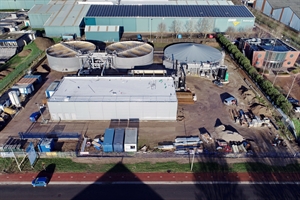The first phase of the construction of the raw materials plant in Zutphen has been completed. The new Nereda® installation at De Mars in Zutphen is finished and has been in operation since last weekend. The second and final phase, namely the construction of the installation that will produce the new raw material Kaumera, is in full swing.
The raw materials factory treats the residual water from the FrieslandCampina dairy factories in Borculo and Lochem. In a few months, it will be the first in the world to produce the new raw material Kaumera from the sludge granules produced. This is a new biological raw material that can be used in many applications, for example in agriculture, horticulture and the construction sector. The development and production of this unique raw material is the result of cooperation between water boards, science and industry. In this way, partners work together to create a clean, sustainable society with as little waste as possible.

Raw material from residual water
Kaumera is a biopolymer grown in the Nereda® plant with special properties. It can retain water but also repel it. By combining Kaumera with another raw material, the character of the substance changes. Therefore it can be used as part of lightweight biocomposites or to make materials fire resistant. Until now, chemical raw materials are mainly used for such applications. Kaumera is a biological substance and therefore offers great advantages.
The plant is expected to produce the first Kaumera in the summer of 2019.
Cooperation
The development of the raw material Kaumera is the result of a collaboration between Royal Haskoning DHV, Delft University of Technology, STOWA (stichting onderzoek waterschappen) (Stichting Toegepast Onderzoek Waterbeheer), the Vallei en Veluwe Water Board, the Rijn en IJssel Water Board and the Energie- en Grondstoffenfabriek (EFGF). All parties contribute some of the knowledge and expertise needed to recover, process and market the new raw material. From laboratory research to full scale recovery. Water boards, the scientific community and the business community work together to create a sustainable circular economy.
The project was made possible by subsidies from the European Union (LIFE), the Ministry of Economic Affairs (DEI) and the Province of Gelderland.